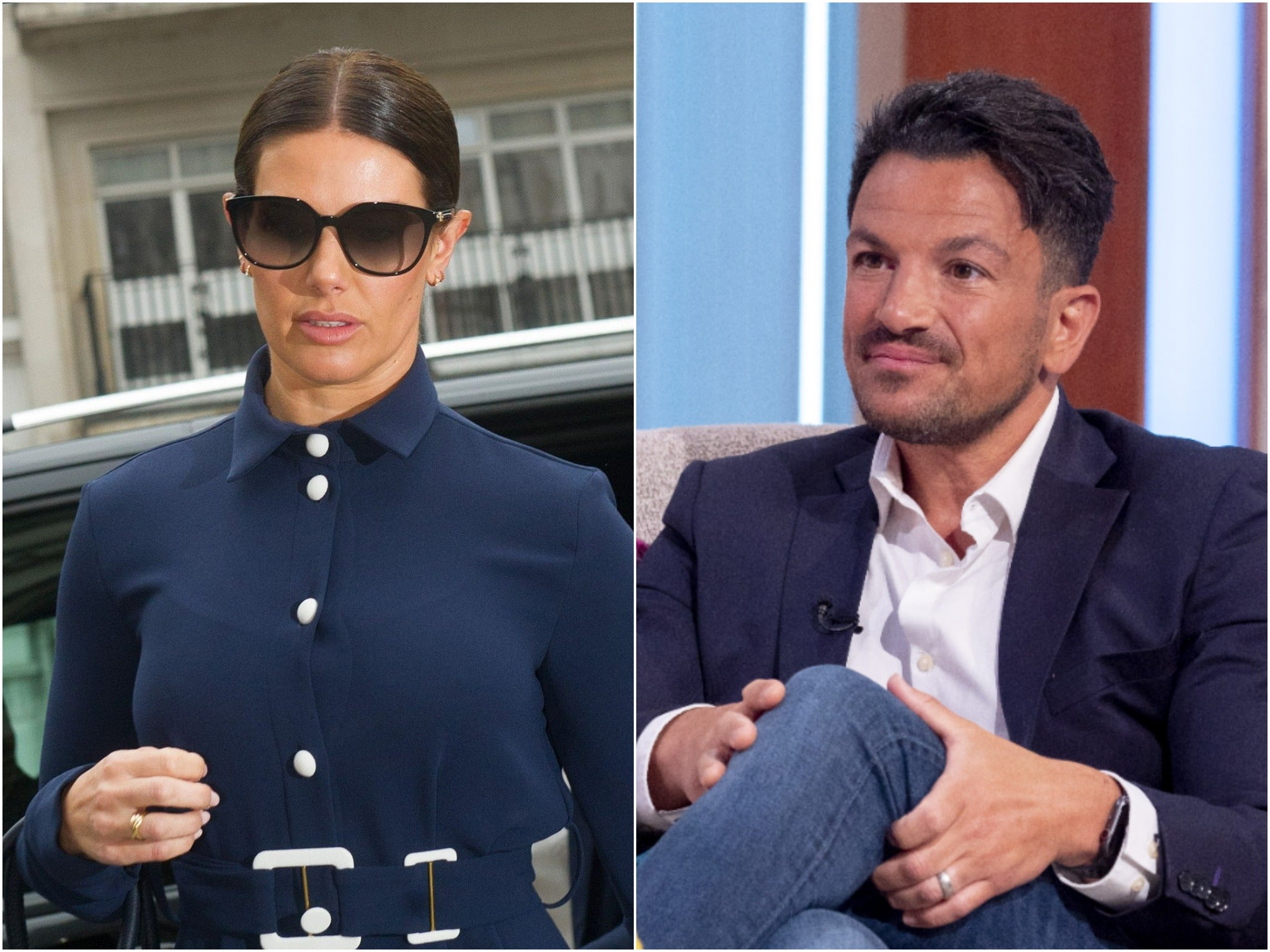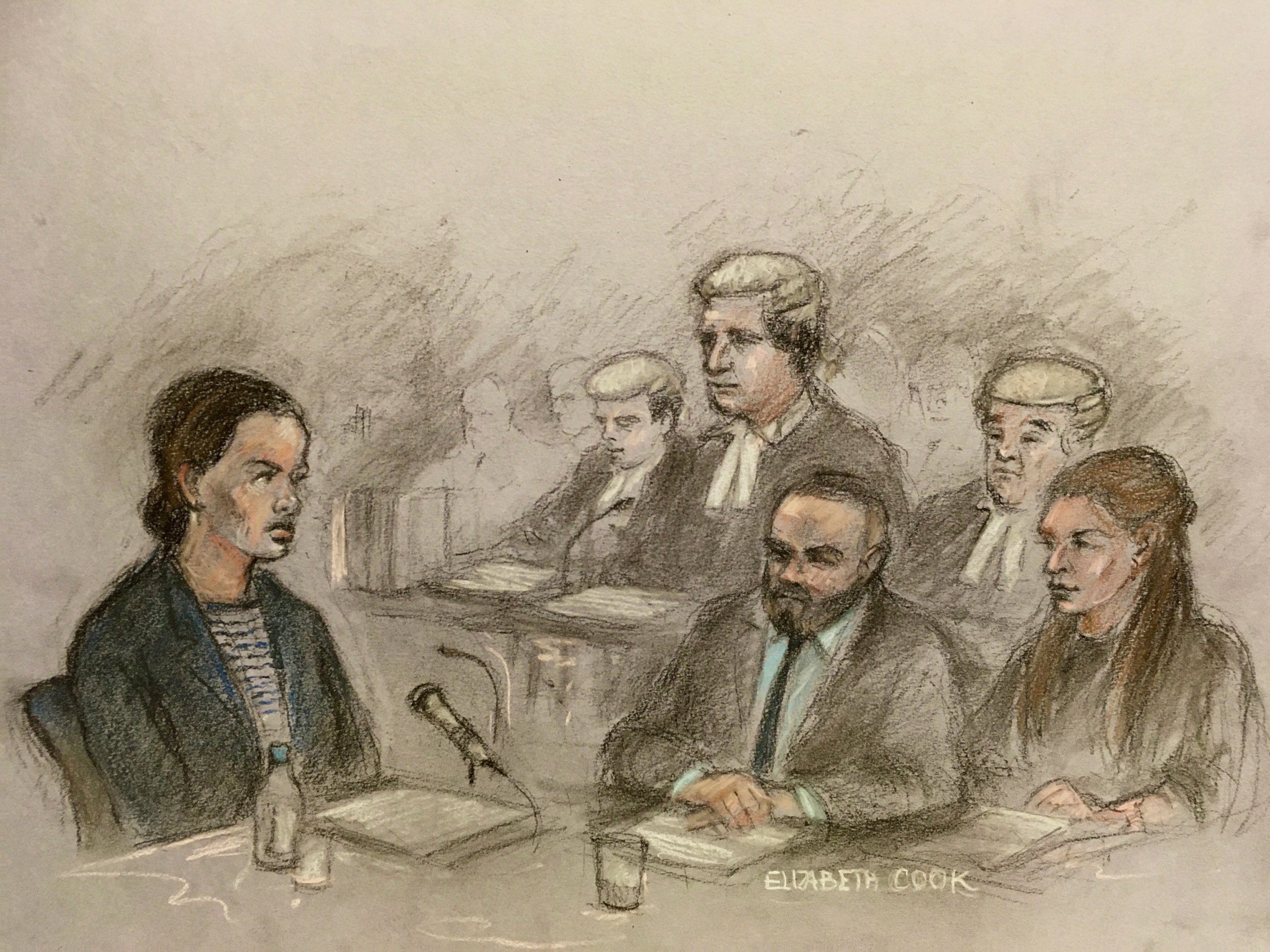Vardy v Rooney: How truthful is Channel 4’s new courtroom drama?
A two-part Channel 4 series recounts the Wagatha Christie trial
The TV dramatisation of the Rebekah Vardy v Coleen Rooney trial is upon us. Exploring the Instagram age whodunnit, the series Vardy v Rooney: A Courtroom Drama portrays one of the most high profile, and most reported, libel cases to ever be brought before the High Court.
The drama, airing on Channel 4 on 21 December, recounts the notorious events that unfolded after Rooney (Chanel Cresswell) publicly alleged that Vardy (Natalia Tena) had been leaking stories about her to The Sun newspaper.
Vardy then sued Rooney for libel in June 2020, with the trial taking place over the course of seven days in May 2022, where the WAGs went head-to-head with their lawyers in the small, mahogany-clad room 13 at the Royal Courts of Justice. Vardy strongly denied leaking fake stories, but the judge, Mrs Justice Steyn, ruled in Rooney’s favour in July.
Though the drama skips the build-up to the legal case and kicks off within the High Court, witness statements are used to explain the events leading up to the trial. Vardy v Rooney recounts events as far back as 2019, when Rooney put on her detective hat to decipher who, of the 300 followers on her private Instagram account, could be leaking information to the press about her. It was from this investigative work that she got the nickname “Wagatha Christie”.
In October 2019, Rooney concluded who was leaking her information in a suspenseful, if not slightly comical, Twitter reveal, writing: “It’s………. Rebekah Vardy’s account.”
Usually, when court cases make their way to the RCJ, they are far more macabre. Vardy v Rooney – essentially a spat between two famous footballer’s wives – and the jovial commentary that surrounded the reporting of trial, however, provided light relief for many people who enjoyed the campness of watching WAGs battle it out.
The script, therefore, is often amusing and absurd, which might suggest that the Channel 4 drama is a work of fiction. This becomes palpable when Vardy insists, under oath, that she was watching Gemma Collins “faceplant” on Dancing on Ice, and that’s why she didn’t reply to one of her agent’s texts.
Brilliant moments like these, which are common throughout the two-parter, could be mistakenly perceived as the script writers injecting some fictional humour into proceedings.
But the script for Vardy v Rooney is taken completely verbatim from the real court transcripts. It’s entirely factual. At the beginning of both episodes, a disclaimer reiterates: “This is a factual drama. It has been created from the courtroom transcripts and witness statements, which have been condensed and edited for clarity.”

Watch Apple TV+ free for 7 day
New subscribers only. £9.99/mo. after free trial. Plan auto-renews until cancelled.
ADVERTISEMENT. If you sign up to this service we will earn commission. This revenue helps to fund journalism across The Independent.

Watch Apple TV+ free for 7 day
New subscribers only. £9.99/mo. after free trial. Plan auto-renews until cancelled.
ADVERTISEMENT. If you sign up to this service we will earn commission. This revenue helps to fund journalism across The Independent.
In fact, the drama’s executive producer, Tom Popay, told The Independent of the making of Vardy v Rooney: “We sent off for the transcripts and when they came… they were absolutely unbelievable. We realised that all the tweets and reports from the trial had just scratched the surface.” Here’s a rundown on how truthful the drama really is.
The infamous WhatsApp messages

Episode one of the two-parter sees Michael Sheen, playing Rooney’s lawyer, intensely scrutinise Vardy’s WhatsApp exchanges with her PR agent, Caroline Watt, who did not give evidence in the trial. The text messages are typed out on screen, showing Vardy and Watt as they allegedly discussed the leaking of stories about people Vardy personally knows to The Sun. The linguistic choices made by Vardy and Watt in their WhatsApp comms are interesting and perhaps a little unbelievable. They use a lot of emojis, while Vardy religiously signs off her messages with a kiss. “Can we not leak a story x,” reads a message sent by Vardy to Watt. Later, Vardy writes “What a c*** x” to Watt. She continues: “I’m going to message her x.”
For those familiar with the popular Instagram account @loveofhuns, finishing messages with a slightly ironic kiss is a textbook hun sign off. It is all the more hilarious then, and unbelievable, to see Vardy and Watt’s texts printed on screen. And that, combined with the sight of some of Britain’s finest lawyers struggling to wrap their heads around the concept of a private Instagram account, makes the whole thing seem slightly made up.
It’s also difficult to believe that Vardy texted Watt saying, “Wow [face with steam from nose emoji] that’s war x,” in regards to Rooney’s claims that Vardy had been leaking information, but yes, this really did happen – and was used as evidence in court. In fact, all of the texts shown in the Channel 4 drama are taken from court evidence obtained from Vardy’s WhatsApp messages.
The language: FFS, chipolatas

Vardy’s colloquial vocabulary comes under fire while she’s being cross-examined by Rooney’s lawyer, played by Michael Sheen. At the time of the real trial, it was reported that Vardy frequently began by answering a question with the words “If I’m honest…” and Sherborne would shoot back: “I would hope you’re honest because you’re sitting in a witness box.”
Many misunderstandings between Sherborne and Vardy are portrayed in the drama. Vardy, for the record, has to explain what the slang term “FFS” means, asking the judge “can I?” before revealing that it means “for f***’s sake”. Again, this really happened.
At the beginning of the courtroom scene in episode one, Sherborne asks Vardy if she believes that leaking a person’s private information is wrong. He then brings up a 2004 News of the World interview in which Vardy spoke about having sex with Peter Andre. Sherborne quotes Vardy as using the words “shaved” and “slobbery”, and cites her comment that Andre “lasts five minutes and then falls asleep”. He then reads out: “When he pulled down his pants, I couldn’t believe it, it was like a miniature chipolata.” Yes, this did actually happen – Vardy said in the courtroom that she had already apologised for the comments and that she was very young at the time.
David Sherborne, Rooney’s lawyer

Another element of the drama that would seem improbable is the portrayal of Rooney’s lawyer, David Sherborne (played by Michael Sheen). Sheen’s performance seems dramatised, as he continually mocks Vardy during his brutal cross-examination. But news reports during the trial show that Sherborne indeed mocked Vardy on several occasions, such as when he made the “Davy Jones” reference to a mobile phone dropped in the bottom of the North Sea.
When Sherborne says it was a “shame” that messages between Watt and journalists who had allegedly been given stories were “lying at the bottom of the sea in Davy Jones’s locker”, Vardy replies, “Who is Davy Jones?” and the courtroom erupts in laughter. Davy Jones’s locker is a metaphor for the bottom of the sea, and it’s used in reference to ships that have sunk and sailors who have drowned and remain in the depths of the ocean. And yes, this exchange really happened.
The “crying with laughter” emoji
The drama recounts how Vardy had revealed information to her agent Watt about footballer Danny Drinkwater, who was arrested for drink driving, in an attempt to leak a story to The Sun. As seen in court evidence, Vardy texted Watt saying: “I want paying for this x.”
The drama shows how the pair then found out that The Sun had already got the story about the arrest from a source at the police station. A text from Vardy is shown in which she says she is “fuming I didn’t give it to you earlier”. Watt replies, saying “that would have been a fortune [crying with laughter emoji]”. In the drama’s depiction of the trial, Vardy says to the judge: “I don’t know whether they’re laughing emojis or if they’re crying.” To which Sherborne replies: “OK, crying with laughter.” Not only is watching a judge and Vardy interpret the meaning of an emoji very funny, this also happened in the actual trial.
The 2016 Euros seating arrangement

A lot went down between the WAGs at the 2016 Euros, according to the Channel 4 drama. First of all, Rooney alleges that Vardy moved seats during a match at the Euros so that she could sit behind her. An FA employee, Harpreet Robertson, takes the stand to explain the seating arrangements for England’s matches at the Euros 2016. Yes, the seating arrangements were really brought in as evidence.
On top of that, in the drama, it’s claimed that Wayne Rooney asked Jamie Vardy if his wife could “calm down” and cut back on her media activities during the Euro 2016 football tournament because it was causing “distractions” for the England team. Apparently, Rooney was asked to do this by then England manager, Hodgson, and his assistant manager, Gary Neville. Again, this is all true, with Wayne Rooney taking the stand under oath.
Instagram technicalities
The Channel 4 drama brushes over the lawyer’s efforts to grapple with Instagram terminology. During the real trial, however, it was quite heavily reported that lots of court time was taken up by the technicalities of a private Instagram account or how Stories actually work.
In the actual trial, Tomilson QC (Simon Coury), who represented Vardy during the proceedings, pressed Rooney during cross-examination by suggesting that a picture taken within the Instagram app and uploaded directly to its Stories function would automatically save to her phone’s camera roll. But Instagram savvy people, like Rooney, know that the “save to camera roll” feature is an optional function. Rooney corrected Tomilson on this in the trial. But other than the discussion of slang term “FFS” and the meaning of the “crying with laughter” emoji, the drama leaves out a lot of the back-and-forth about social media terminology.
Rebekah Vardy’s dramatic exit
In the final episode, Vardy is seen emotionally storming out of the court room before the concluding statements are made. In the actual trial, Vardy did indeed leave the High Court just 30 minutes into the final day of proceedings, after the closing statements had started.
The first episode of Vardy v Rooney: A Courtroom Drama airs on Channel 4 at 9pm on Wednesday 21 December. Episode two airs on Thursday 22 December.
Join our commenting forum
Join thought-provoking conversations, follow other Independent readers and see their replies
Comments
Bookmark popover
Removed from bookmarks